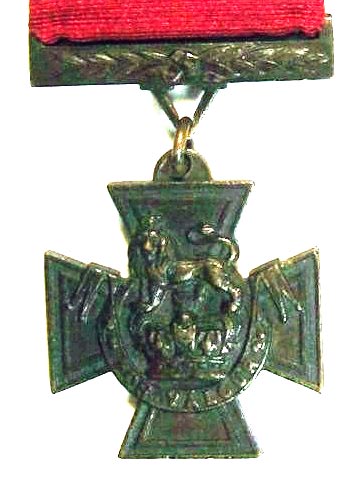Sergeant George Walters VC
George Walters VC (15th September 1829 – 3rd June 1872) was a recipient of the Victoria Cross, the highest and most prestigious award for gallantry in the face of the enemy that can be awarded to British and Commonwealth forces.
Born on 15th September 1829 in Newport Pagnell. His father was James Walters, an Innkeeper in the town. His mother was Jane Green. George was the third child of seven. Unfortunately there are no records of George’s early life.
In 1848 George enlisted with the 49th Foot Regiment, later to be known as the 49th (Hertfordshire) Regiment. He later fought in the Crimean war where on 5th November 1854 8,000 British soldiers sustained a hand-to-hand combat with 50,000 Russian troops at the battle of Inkerman.
During the course of this fierce encounter Brigadier-General Henry Adams CB had his horse killed under him, and was also wounded in the leg it seemed certain that he would be either captured or bayoneted by the Russians around him. Fortunately Sergeant George Walters saw that his old commanding officer was in difficulties, and charged single-handed into the enemy surrounding the fallen general and drove them off with his bayonet. He then carried his officer back to comparative safety, Adams also received the Victoria Cross and although his wound was in the ankle only, it became infected and he died a few days later.
On the 5th January 1857 George married on and left the Army joining the Metropolitan Police as Constable 444 of R Division. It was not until 24th February 1857 that the first awards of the VC were published in the London Gazette. Where the formal, rather stilted language of citations hardly ever conveys the violence, danger and sheer excitement of the actions, which win awards. George Walter’s deed was gazetted as follows:
Sergeant George Walters highly distinguished himself at the Battle of Inkermann, in having rescued Brigadier-General Adams, C.B., when surrounded by Russians, one of whom he bayoneted
On the 26th June 1857 in Hyde Park in London Queen Victoria bestowed George with his VC.
On 3 June 1872, George died at West Lodge, Park Crescent, Marylebone. George had been suffering with Phthisis for three years, which literally means a wasting disease but almost invariably will mean pulmonary tuberculosis or any debilitating lung or throat affections, a severe cough, asthma. He was buried on 9 June 1872 in the City of Westminster Cemetery in Finchley.
A commemorative plaque was erected on wall adjacent to the war memorial outside St. Peter and St. Pauls Church in his memory. The inscription read as follows:
George Walters was born in Newport Pagnell in 1829. In 1848 he joined the 49th foot and fought in The Crimea at the Battles of the Alma and Inkerman.
Queen Victoria presented his Victoria Cross, one of the first to be awarded, in Hyde Park on 26th June 1857, he died on the 3rd June 1872 aged 43.
The 49th (Princess Charlotte of Wales Hertfordshire) Regiment was raised in 1744 and became the Berkshire Regiment in 1881.
After amalgamation with the Wiltshire Regiment it is now celebrated in the Royal Gloucestershire, Berkshire and Wiltshire regiment.
At 8 am on the 5th November 1854, 700 men of the 48th and the 41st Under Brigadier Adams held the sandbag battery on Inkerman against an attack by three Russian Regiments, Adams fell severely wounded and with Walters was surrounded. Walters, carrying the officer, fought through to safety with the bayonet.
A gallant son of Newport Pagnell.

